Business Law Report: Contract Law and Consumer Guarantees Analysis
VerifiedAdded on 2021/05/27
|10
|2351
|49
Report
AI Summary
This report provides a detailed analysis of contract law principles. It begins by outlining the essential elements of a valid contract: offer, acceptance, intention to create legal relations, and consideration, applying these concepts to a case study involving a café and a customer named Avinash. The report then addresses the issue of an exclusion clause printed on a ticket, examining its validity and the café's potential liability for damages. It explores the relevant legal principles, including the application of exclusion clauses, consumer guarantees under the Australian Consumer Law (ACL), and the impact of the timing of notice regarding the exclusion clause. Furthermore, the report distinguishes between express and implied terms, conditions, and warranties within a contract. The report concludes that the exclusion clause would not restrict the café's liability, and Avinash is entitled to claim damages. The report also discusses the implications of consumer guarantees under the ACL and the remedies available to consumers.
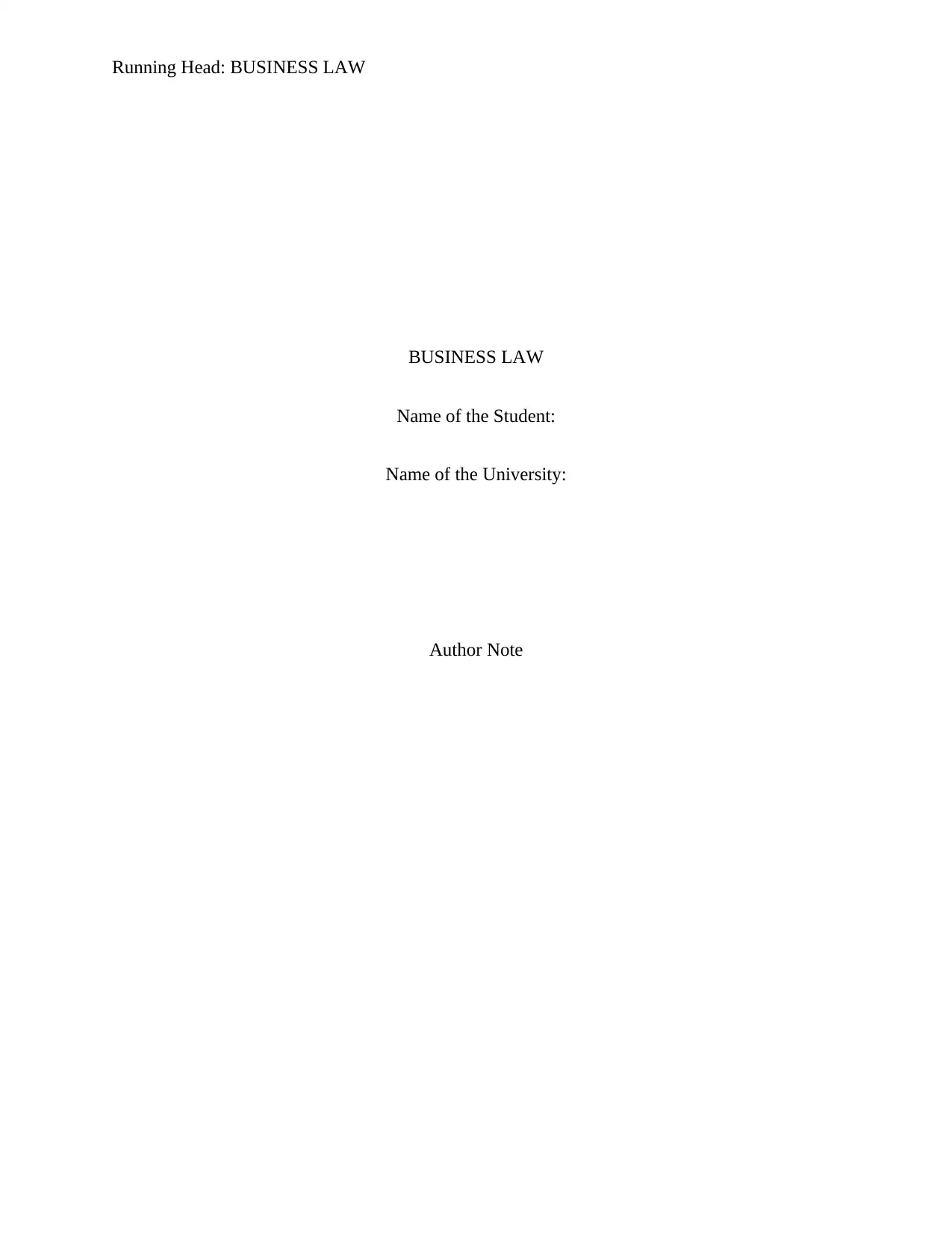
Running Head: BUSINESS LAW
BUSINESS LAW
Name of the Student:
Name of the University:
Author Note
BUSINESS LAW
Name of the Student:
Name of the University:
Author Note
Paraphrase This Document
Need a fresh take? Get an instant paraphrase of this document with our AI Paraphraser
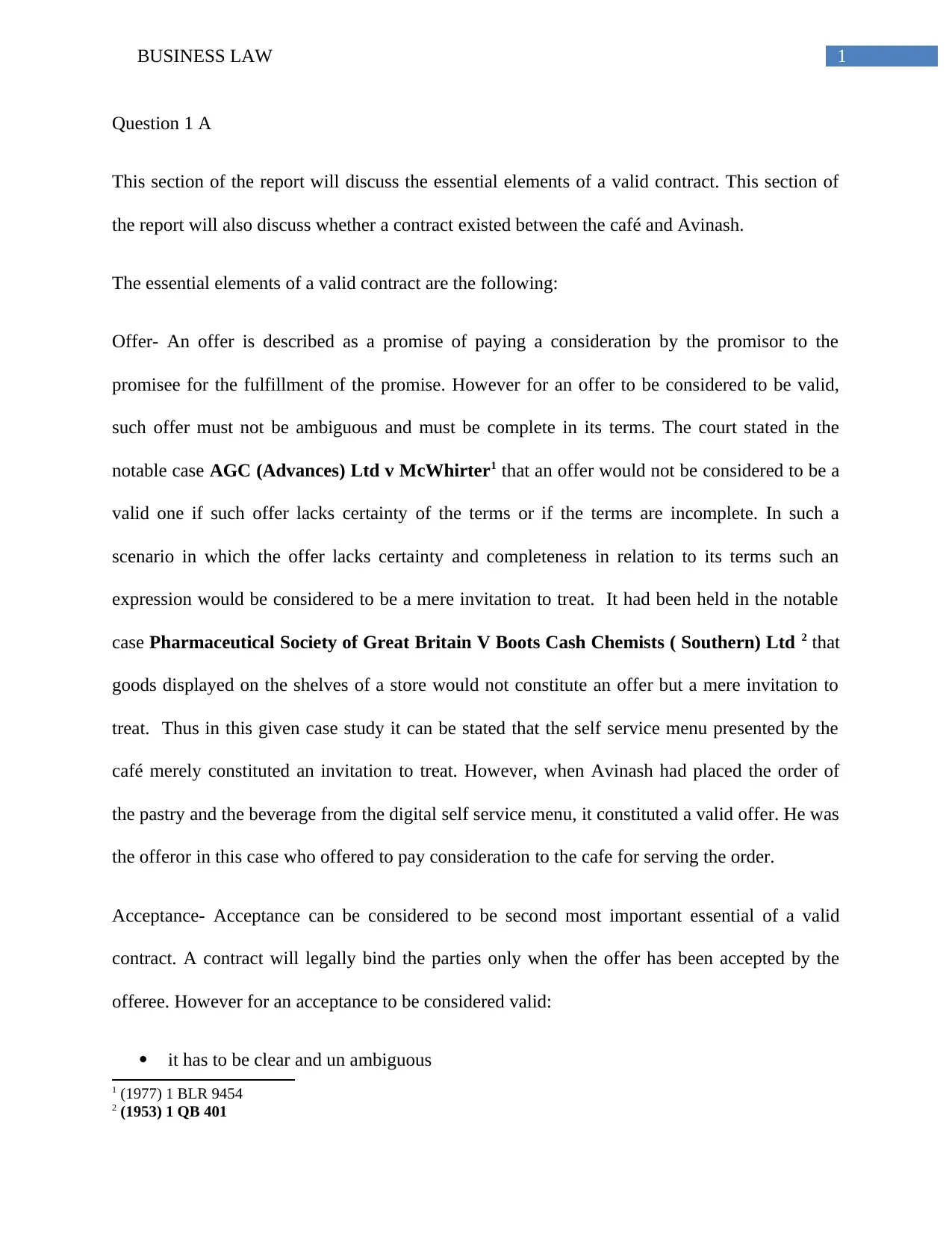
1BUSINESS LAW
Question 1 A
This section of the report will discuss the essential elements of a valid contract. This section of
the report will also discuss whether a contract existed between the café and Avinash.
The essential elements of a valid contract are the following:
Offer- An offer is described as a promise of paying a consideration by the promisor to the
promisee for the fulfillment of the promise. However for an offer to be considered to be valid,
such offer must not be ambiguous and must be complete in its terms. The court stated in the
notable case AGC (Advances) Ltd v McWhirter1 that an offer would not be considered to be a
valid one if such offer lacks certainty of the terms or if the terms are incomplete. In such a
scenario in which the offer lacks certainty and completeness in relation to its terms such an
expression would be considered to be a mere invitation to treat. It had been held in the notable
case Pharmaceutical Society of Great Britain V Boots Cash Chemists ( Southern) Ltd 2 that
goods displayed on the shelves of a store would not constitute an offer but a mere invitation to
treat. Thus in this given case study it can be stated that the self service menu presented by the
café merely constituted an invitation to treat. However, when Avinash had placed the order of
the pastry and the beverage from the digital self service menu, it constituted a valid offer. He was
the offeror in this case who offered to pay consideration to the cafe for serving the order.
Acceptance- Acceptance can be considered to be second most important essential of a valid
contract. A contract will legally bind the parties only when the offer has been accepted by the
offeree. However for an acceptance to be considered valid:
it has to be clear and un ambiguous
1 (1977) 1 BLR 9454
2 (1953) 1 QB 401
Question 1 A
This section of the report will discuss the essential elements of a valid contract. This section of
the report will also discuss whether a contract existed between the café and Avinash.
The essential elements of a valid contract are the following:
Offer- An offer is described as a promise of paying a consideration by the promisor to the
promisee for the fulfillment of the promise. However for an offer to be considered to be valid,
such offer must not be ambiguous and must be complete in its terms. The court stated in the
notable case AGC (Advances) Ltd v McWhirter1 that an offer would not be considered to be a
valid one if such offer lacks certainty of the terms or if the terms are incomplete. In such a
scenario in which the offer lacks certainty and completeness in relation to its terms such an
expression would be considered to be a mere invitation to treat. It had been held in the notable
case Pharmaceutical Society of Great Britain V Boots Cash Chemists ( Southern) Ltd 2 that
goods displayed on the shelves of a store would not constitute an offer but a mere invitation to
treat. Thus in this given case study it can be stated that the self service menu presented by the
café merely constituted an invitation to treat. However, when Avinash had placed the order of
the pastry and the beverage from the digital self service menu, it constituted a valid offer. He was
the offeror in this case who offered to pay consideration to the cafe for serving the order.
Acceptance- Acceptance can be considered to be second most important essential of a valid
contract. A contract will legally bind the parties only when the offer has been accepted by the
offeree. However for an acceptance to be considered valid:
it has to be clear and un ambiguous
1 (1977) 1 BLR 9454
2 (1953) 1 QB 401
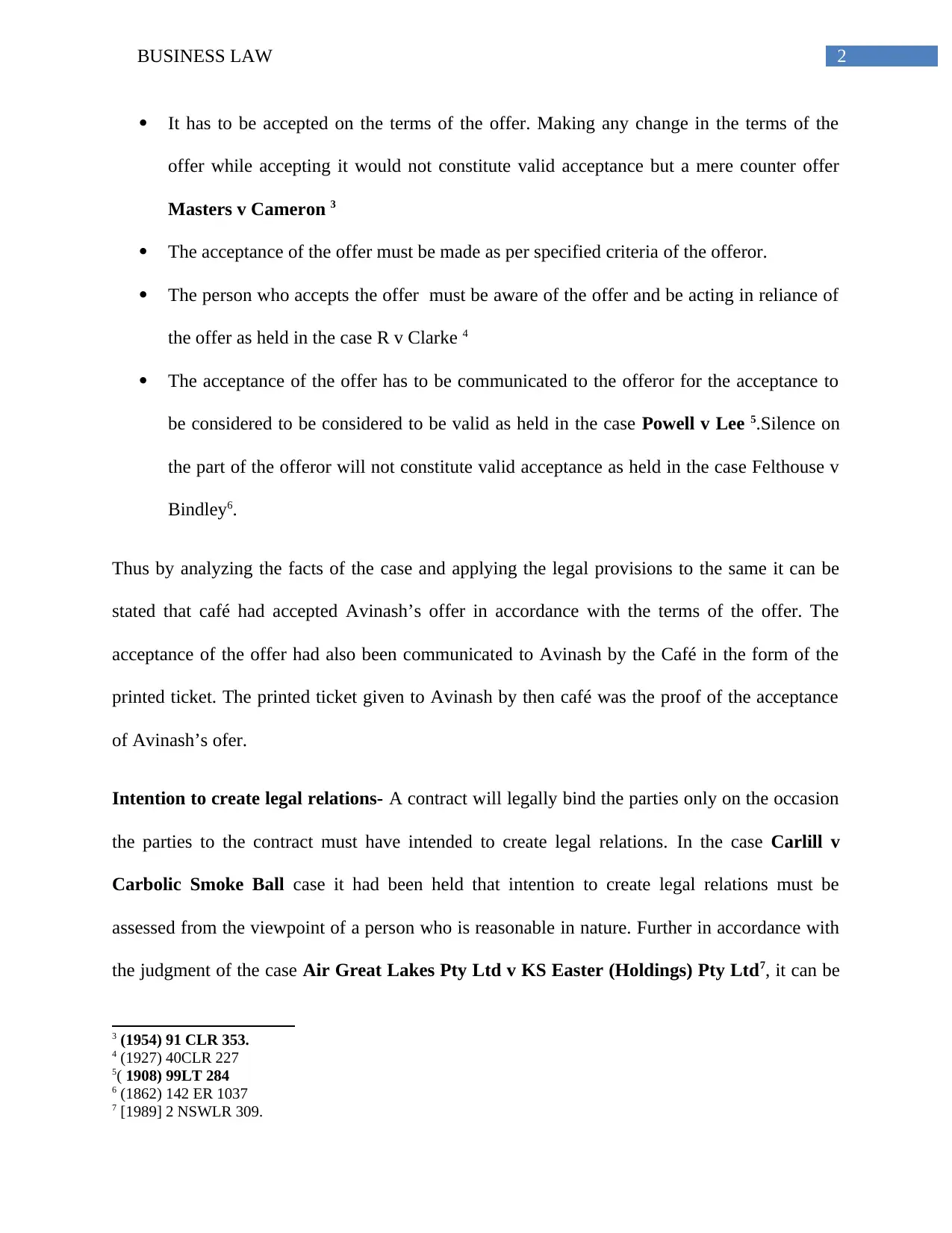
2BUSINESS LAW
It has to be accepted on the terms of the offer. Making any change in the terms of the
offer while accepting it would not constitute valid acceptance but a mere counter offer
Masters v Cameron 3
The acceptance of the offer must be made as per specified criteria of the offeror.
The person who accepts the offer must be aware of the offer and be acting in reliance of
the offer as held in the case R v Clarke 4
The acceptance of the offer has to be communicated to the offeror for the acceptance to
be considered to be considered to be valid as held in the case Powell v Lee 5.Silence on
the part of the offeror will not constitute valid acceptance as held in the case Felthouse v
Bindley6.
Thus by analyzing the facts of the case and applying the legal provisions to the same it can be
stated that café had accepted Avinash’s offer in accordance with the terms of the offer. The
acceptance of the offer had also been communicated to Avinash by the Café in the form of the
printed ticket. The printed ticket given to Avinash by then café was the proof of the acceptance
of Avinash’s ofer.
Intention to create legal relations- A contract will legally bind the parties only on the occasion
the parties to the contract must have intended to create legal relations. In the case Carlill v
Carbolic Smoke Ball case it had been held that intention to create legal relations must be
assessed from the viewpoint of a person who is reasonable in nature. Further in accordance with
the judgment of the case Air Great Lakes Pty Ltd v KS Easter (Holdings) Pty Ltd7, it can be
3 (1954) 91 CLR 353.
4 (1927) 40CLR 227
5( 1908) 99LT 284
6 (1862) 142 ER 1037
7 [1989] 2 NSWLR 309.
It has to be accepted on the terms of the offer. Making any change in the terms of the
offer while accepting it would not constitute valid acceptance but a mere counter offer
Masters v Cameron 3
The acceptance of the offer must be made as per specified criteria of the offeror.
The person who accepts the offer must be aware of the offer and be acting in reliance of
the offer as held in the case R v Clarke 4
The acceptance of the offer has to be communicated to the offeror for the acceptance to
be considered to be considered to be valid as held in the case Powell v Lee 5.Silence on
the part of the offeror will not constitute valid acceptance as held in the case Felthouse v
Bindley6.
Thus by analyzing the facts of the case and applying the legal provisions to the same it can be
stated that café had accepted Avinash’s offer in accordance with the terms of the offer. The
acceptance of the offer had also been communicated to Avinash by the Café in the form of the
printed ticket. The printed ticket given to Avinash by then café was the proof of the acceptance
of Avinash’s ofer.
Intention to create legal relations- A contract will legally bind the parties only on the occasion
the parties to the contract must have intended to create legal relations. In the case Carlill v
Carbolic Smoke Ball case it had been held that intention to create legal relations must be
assessed from the viewpoint of a person who is reasonable in nature. Further in accordance with
the judgment of the case Air Great Lakes Pty Ltd v KS Easter (Holdings) Pty Ltd7, it can be
3 (1954) 91 CLR 353.
4 (1927) 40CLR 227
5( 1908) 99LT 284
6 (1862) 142 ER 1037
7 [1989] 2 NSWLR 309.
⊘ This is a preview!⊘
Do you want full access?
Subscribe today to unlock all pages.

Trusted by 1+ million students worldwide
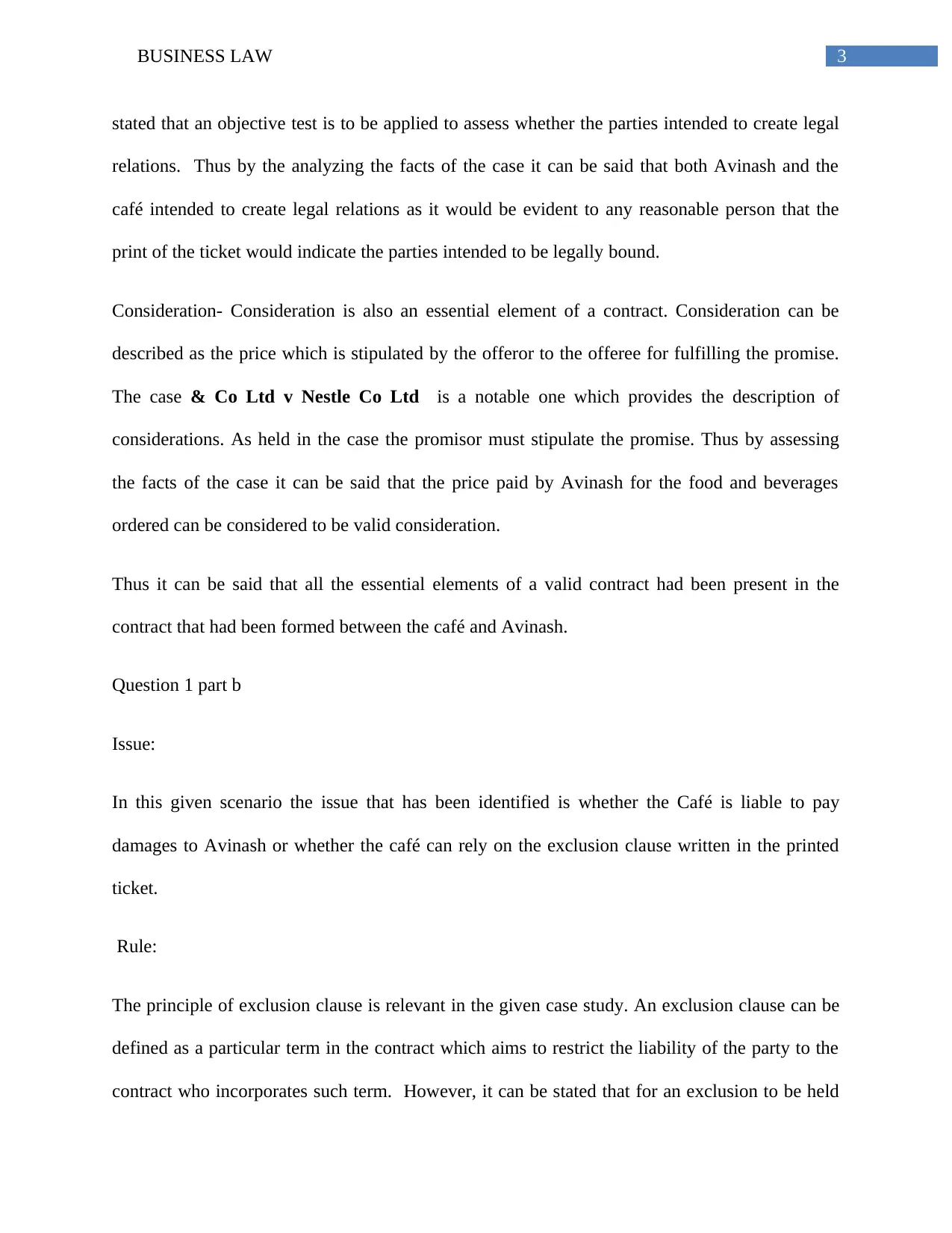
3BUSINESS LAW
stated that an objective test is to be applied to assess whether the parties intended to create legal
relations. Thus by the analyzing the facts of the case it can be said that both Avinash and the
café intended to create legal relations as it would be evident to any reasonable person that the
print of the ticket would indicate the parties intended to be legally bound.
Consideration- Consideration is also an essential element of a contract. Consideration can be
described as the price which is stipulated by the offeror to the offeree for fulfilling the promise.
The case & Co Ltd v Nestle Co Ltd is a notable one which provides the description of
considerations. As held in the case the promisor must stipulate the promise. Thus by assessing
the facts of the case it can be said that the price paid by Avinash for the food and beverages
ordered can be considered to be valid consideration.
Thus it can be said that all the essential elements of a valid contract had been present in the
contract that had been formed between the café and Avinash.
Question 1 part b
Issue:
In this given scenario the issue that has been identified is whether the Café is liable to pay
damages to Avinash or whether the café can rely on the exclusion clause written in the printed
ticket.
Rule:
The principle of exclusion clause is relevant in the given case study. An exclusion clause can be
defined as a particular term in the contract which aims to restrict the liability of the party to the
contract who incorporates such term. However, it can be stated that for an exclusion to be held
stated that an objective test is to be applied to assess whether the parties intended to create legal
relations. Thus by the analyzing the facts of the case it can be said that both Avinash and the
café intended to create legal relations as it would be evident to any reasonable person that the
print of the ticket would indicate the parties intended to be legally bound.
Consideration- Consideration is also an essential element of a contract. Consideration can be
described as the price which is stipulated by the offeror to the offeree for fulfilling the promise.
The case & Co Ltd v Nestle Co Ltd is a notable one which provides the description of
considerations. As held in the case the promisor must stipulate the promise. Thus by assessing
the facts of the case it can be said that the price paid by Avinash for the food and beverages
ordered can be considered to be valid consideration.
Thus it can be said that all the essential elements of a valid contract had been present in the
contract that had been formed between the café and Avinash.
Question 1 part b
Issue:
In this given scenario the issue that has been identified is whether the Café is liable to pay
damages to Avinash or whether the café can rely on the exclusion clause written in the printed
ticket.
Rule:
The principle of exclusion clause is relevant in the given case study. An exclusion clause can be
defined as a particular term in the contract which aims to restrict the liability of the party to the
contract who incorporates such term. However, it can be stated that for an exclusion to be held
Paraphrase This Document
Need a fresh take? Get an instant paraphrase of this document with our AI Paraphraser
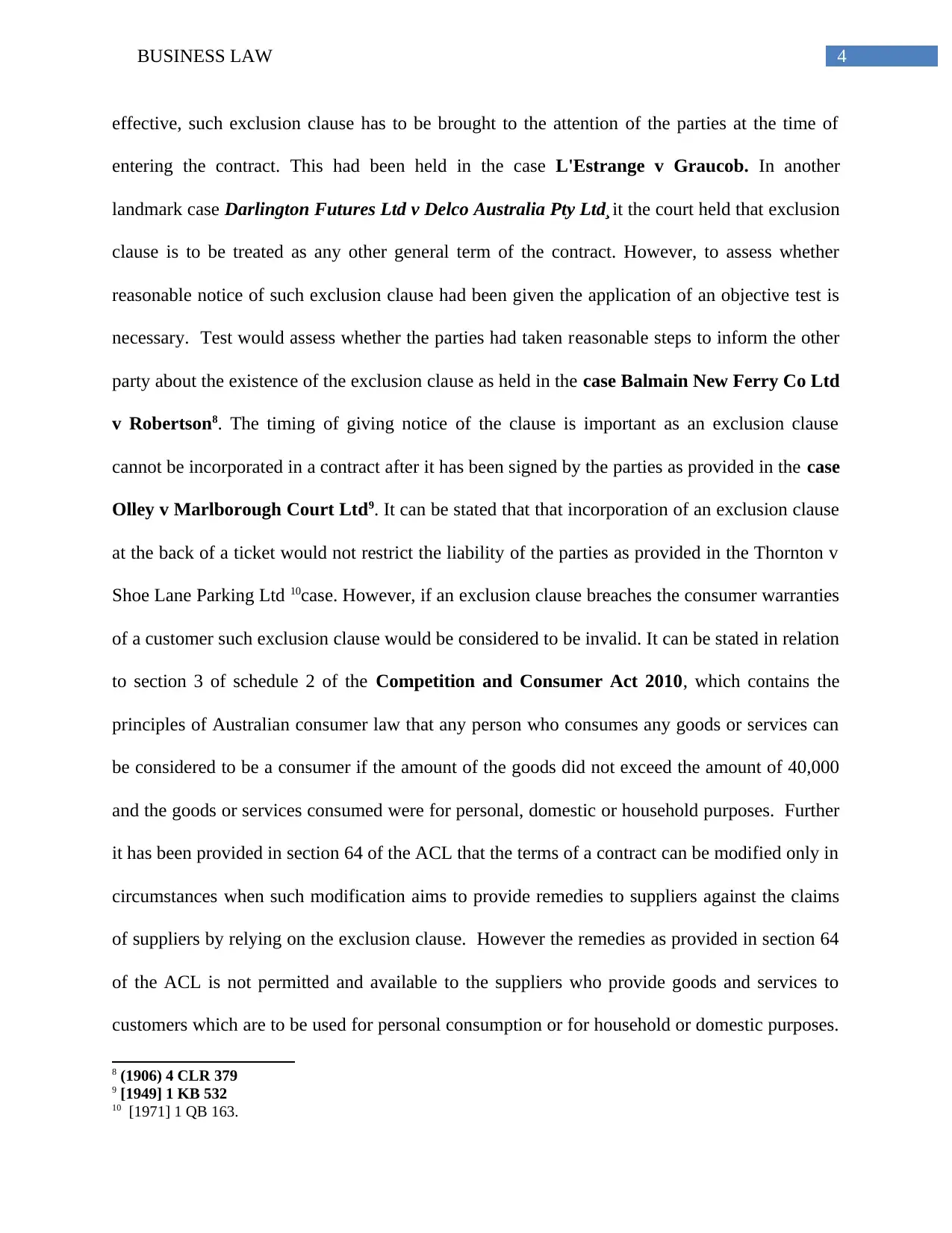
4BUSINESS LAW
effective, such exclusion clause has to be brought to the attention of the parties at the time of
entering the contract. This had been held in the case L'Estrange v Graucob. In another
landmark case Darlington Futures Ltd v Delco Australia Pty Ltd¸it the court held that exclusion
clause is to be treated as any other general term of the contract. However, to assess whether
reasonable notice of such exclusion clause had been given the application of an objective test is
necessary. Test would assess whether the parties had taken reasonable steps to inform the other
party about the existence of the exclusion clause as held in the case Balmain New Ferry Co Ltd
v Robertson8. The timing of giving notice of the clause is important as an exclusion clause
cannot be incorporated in a contract after it has been signed by the parties as provided in the case
Olley v Marlborough Court Ltd9. It can be stated that that incorporation of an exclusion clause
at the back of a ticket would not restrict the liability of the parties as provided in the Thornton v
Shoe Lane Parking Ltd 10case. However, if an exclusion clause breaches the consumer warranties
of a customer such exclusion clause would be considered to be invalid. It can be stated in relation
to section 3 of schedule 2 of the Competition and Consumer Act 2010, which contains the
principles of Australian consumer law that any person who consumes any goods or services can
be considered to be a consumer if the amount of the goods did not exceed the amount of 40,000
and the goods or services consumed were for personal, domestic or household purposes. Further
it has been provided in section 64 of the ACL that the terms of a contract can be modified only in
circumstances when such modification aims to provide remedies to suppliers against the claims
of suppliers by relying on the exclusion clause. However the remedies as provided in section 64
of the ACL is not permitted and available to the suppliers who provide goods and services to
customers which are to be used for personal consumption or for household or domestic purposes.
8 (1906) 4 CLR 379
9 [1949] 1 KB 532
10 [1971] 1 QB 163.
effective, such exclusion clause has to be brought to the attention of the parties at the time of
entering the contract. This had been held in the case L'Estrange v Graucob. In another
landmark case Darlington Futures Ltd v Delco Australia Pty Ltd¸it the court held that exclusion
clause is to be treated as any other general term of the contract. However, to assess whether
reasonable notice of such exclusion clause had been given the application of an objective test is
necessary. Test would assess whether the parties had taken reasonable steps to inform the other
party about the existence of the exclusion clause as held in the case Balmain New Ferry Co Ltd
v Robertson8. The timing of giving notice of the clause is important as an exclusion clause
cannot be incorporated in a contract after it has been signed by the parties as provided in the case
Olley v Marlborough Court Ltd9. It can be stated that that incorporation of an exclusion clause
at the back of a ticket would not restrict the liability of the parties as provided in the Thornton v
Shoe Lane Parking Ltd 10case. However, if an exclusion clause breaches the consumer warranties
of a customer such exclusion clause would be considered to be invalid. It can be stated in relation
to section 3 of schedule 2 of the Competition and Consumer Act 2010, which contains the
principles of Australian consumer law that any person who consumes any goods or services can
be considered to be a consumer if the amount of the goods did not exceed the amount of 40,000
and the goods or services consumed were for personal, domestic or household purposes. Further
it has been provided in section 64 of the ACL that the terms of a contract can be modified only in
circumstances when such modification aims to provide remedies to suppliers against the claims
of suppliers by relying on the exclusion clause. However the remedies as provided in section 64
of the ACL is not permitted and available to the suppliers who provide goods and services to
customers which are to be used for personal consumption or for household or domestic purposes.
8 (1906) 4 CLR 379
9 [1949] 1 KB 532
10 [1971] 1 QB 163.
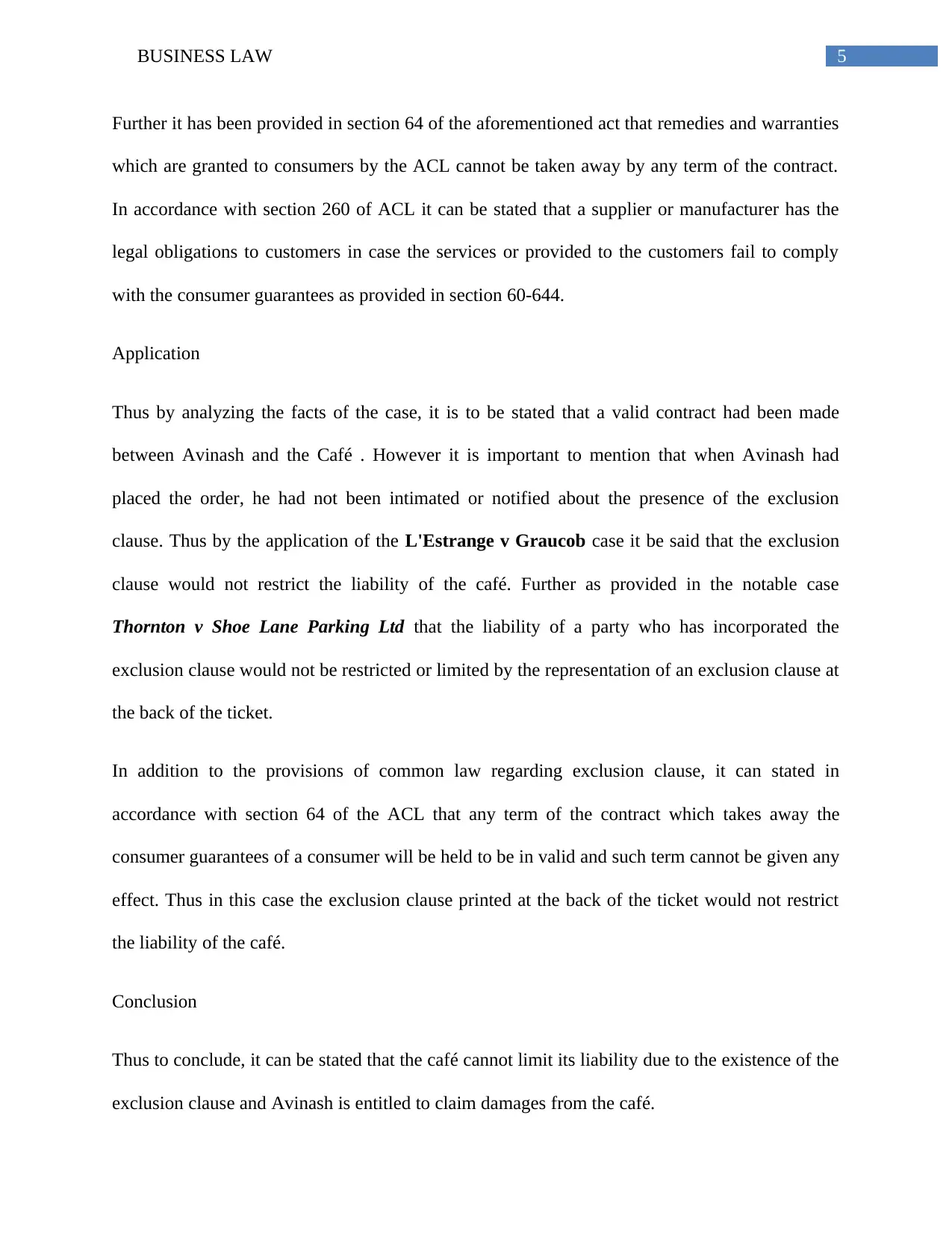
5BUSINESS LAW
Further it has been provided in section 64 of the aforementioned act that remedies and warranties
which are granted to consumers by the ACL cannot be taken away by any term of the contract.
In accordance with section 260 of ACL it can be stated that a supplier or manufacturer has the
legal obligations to customers in case the services or provided to the customers fail to comply
with the consumer guarantees as provided in section 60-644.
Application
Thus by analyzing the facts of the case, it is to be stated that a valid contract had been made
between Avinash and the Café . However it is important to mention that when Avinash had
placed the order, he had not been intimated or notified about the presence of the exclusion
clause. Thus by the application of the L'Estrange v Graucob case it be said that the exclusion
clause would not restrict the liability of the café. Further as provided in the notable case
Thornton v Shoe Lane Parking Ltd that the liability of a party who has incorporated the
exclusion clause would not be restricted or limited by the representation of an exclusion clause at
the back of the ticket.
In addition to the provisions of common law regarding exclusion clause, it can stated in
accordance with section 64 of the ACL that any term of the contract which takes away the
consumer guarantees of a consumer will be held to be in valid and such term cannot be given any
effect. Thus in this case the exclusion clause printed at the back of the ticket would not restrict
the liability of the café.
Conclusion
Thus to conclude, it can be stated that the café cannot limit its liability due to the existence of the
exclusion clause and Avinash is entitled to claim damages from the café.
Further it has been provided in section 64 of the aforementioned act that remedies and warranties
which are granted to consumers by the ACL cannot be taken away by any term of the contract.
In accordance with section 260 of ACL it can be stated that a supplier or manufacturer has the
legal obligations to customers in case the services or provided to the customers fail to comply
with the consumer guarantees as provided in section 60-644.
Application
Thus by analyzing the facts of the case, it is to be stated that a valid contract had been made
between Avinash and the Café . However it is important to mention that when Avinash had
placed the order, he had not been intimated or notified about the presence of the exclusion
clause. Thus by the application of the L'Estrange v Graucob case it be said that the exclusion
clause would not restrict the liability of the café. Further as provided in the notable case
Thornton v Shoe Lane Parking Ltd that the liability of a party who has incorporated the
exclusion clause would not be restricted or limited by the representation of an exclusion clause at
the back of the ticket.
In addition to the provisions of common law regarding exclusion clause, it can stated in
accordance with section 64 of the ACL that any term of the contract which takes away the
consumer guarantees of a consumer will be held to be in valid and such term cannot be given any
effect. Thus in this case the exclusion clause printed at the back of the ticket would not restrict
the liability of the café.
Conclusion
Thus to conclude, it can be stated that the café cannot limit its liability due to the existence of the
exclusion clause and Avinash is entitled to claim damages from the café.
⊘ This is a preview!⊘
Do you want full access?
Subscribe today to unlock all pages.

Trusted by 1+ million students worldwide
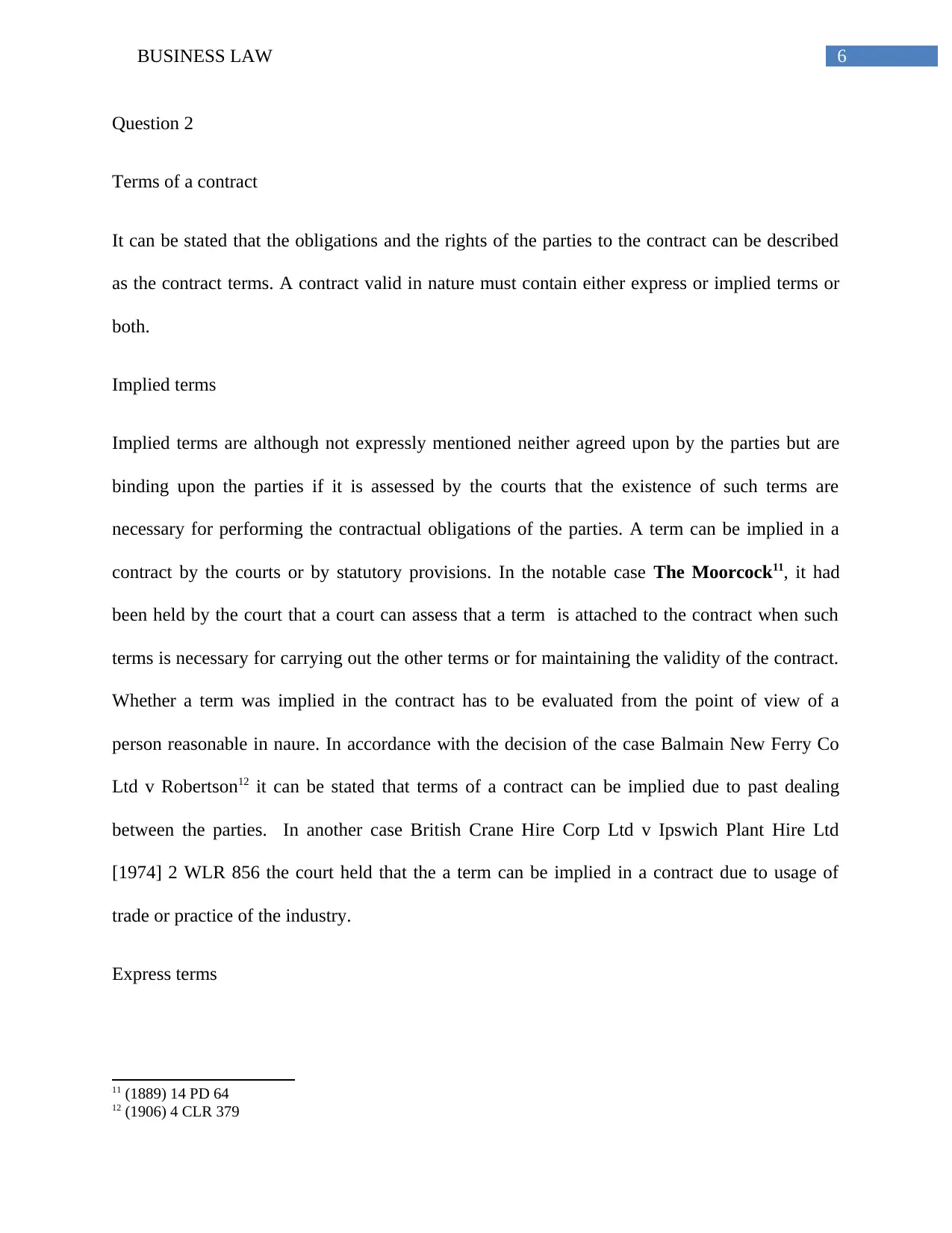
6BUSINESS LAW
Question 2
Terms of a contract
It can be stated that the obligations and the rights of the parties to the contract can be described
as the contract terms. A contract valid in nature must contain either express or implied terms or
both.
Implied terms
Implied terms are although not expressly mentioned neither agreed upon by the parties but are
binding upon the parties if it is assessed by the courts that the existence of such terms are
necessary for performing the contractual obligations of the parties. A term can be implied in a
contract by the courts or by statutory provisions. In the notable case The Moorcock11, it had
been held by the court that a court can assess that a term is attached to the contract when such
terms is necessary for carrying out the other terms or for maintaining the validity of the contract.
Whether a term was implied in the contract has to be evaluated from the point of view of a
person reasonable in naure. In accordance with the decision of the case Balmain New Ferry Co
Ltd v Robertson12 it can be stated that terms of a contract can be implied due to past dealing
between the parties. In another case British Crane Hire Corp Ltd v Ipswich Plant Hire Ltd
[1974] 2 WLR 856 the court held that the a term can be implied in a contract due to usage of
trade or practice of the industry.
Express terms
11 (1889) 14 PD 64
12 (1906) 4 CLR 379
Question 2
Terms of a contract
It can be stated that the obligations and the rights of the parties to the contract can be described
as the contract terms. A contract valid in nature must contain either express or implied terms or
both.
Implied terms
Implied terms are although not expressly mentioned neither agreed upon by the parties but are
binding upon the parties if it is assessed by the courts that the existence of such terms are
necessary for performing the contractual obligations of the parties. A term can be implied in a
contract by the courts or by statutory provisions. In the notable case The Moorcock11, it had
been held by the court that a court can assess that a term is attached to the contract when such
terms is necessary for carrying out the other terms or for maintaining the validity of the contract.
Whether a term was implied in the contract has to be evaluated from the point of view of a
person reasonable in naure. In accordance with the decision of the case Balmain New Ferry Co
Ltd v Robertson12 it can be stated that terms of a contract can be implied due to past dealing
between the parties. In another case British Crane Hire Corp Ltd v Ipswich Plant Hire Ltd
[1974] 2 WLR 856 the court held that the a term can be implied in a contract due to usage of
trade or practice of the industry.
Express terms
11 (1889) 14 PD 64
12 (1906) 4 CLR 379
Paraphrase This Document
Need a fresh take? Get an instant paraphrase of this document with our AI Paraphraser
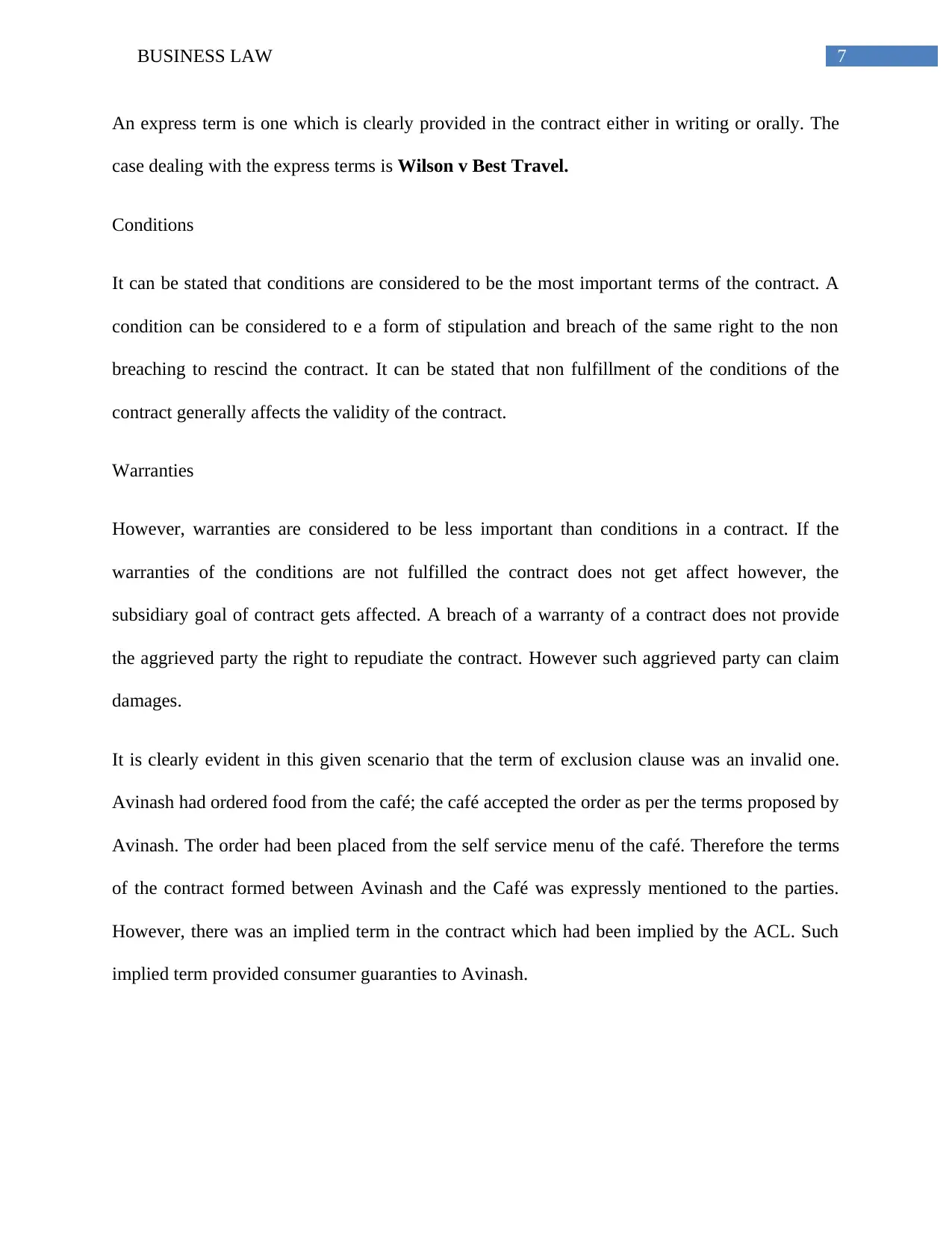
7BUSINESS LAW
An express term is one which is clearly provided in the contract either in writing or orally. The
case dealing with the express terms is Wilson v Best Travel.
Conditions
It can be stated that conditions are considered to be the most important terms of the contract. A
condition can be considered to e a form of stipulation and breach of the same right to the non
breaching to rescind the contract. It can be stated that non fulfillment of the conditions of the
contract generally affects the validity of the contract.
Warranties
However, warranties are considered to be less important than conditions in a contract. If the
warranties of the conditions are not fulfilled the contract does not get affect however, the
subsidiary goal of contract gets affected. A breach of a warranty of a contract does not provide
the aggrieved party the right to repudiate the contract. However such aggrieved party can claim
damages.
It is clearly evident in this given scenario that the term of exclusion clause was an invalid one.
Avinash had ordered food from the café; the café accepted the order as per the terms proposed by
Avinash. The order had been placed from the self service menu of the café. Therefore the terms
of the contract formed between Avinash and the Café was expressly mentioned to the parties.
However, there was an implied term in the contract which had been implied by the ACL. Such
implied term provided consumer guaranties to Avinash.
An express term is one which is clearly provided in the contract either in writing or orally. The
case dealing with the express terms is Wilson v Best Travel.
Conditions
It can be stated that conditions are considered to be the most important terms of the contract. A
condition can be considered to e a form of stipulation and breach of the same right to the non
breaching to rescind the contract. It can be stated that non fulfillment of the conditions of the
contract generally affects the validity of the contract.
Warranties
However, warranties are considered to be less important than conditions in a contract. If the
warranties of the conditions are not fulfilled the contract does not get affect however, the
subsidiary goal of contract gets affected. A breach of a warranty of a contract does not provide
the aggrieved party the right to repudiate the contract. However such aggrieved party can claim
damages.
It is clearly evident in this given scenario that the term of exclusion clause was an invalid one.
Avinash had ordered food from the café; the café accepted the order as per the terms proposed by
Avinash. The order had been placed from the self service menu of the café. Therefore the terms
of the contract formed between Avinash and the Café was expressly mentioned to the parties.
However, there was an implied term in the contract which had been implied by the ACL. Such
implied term provided consumer guaranties to Avinash.
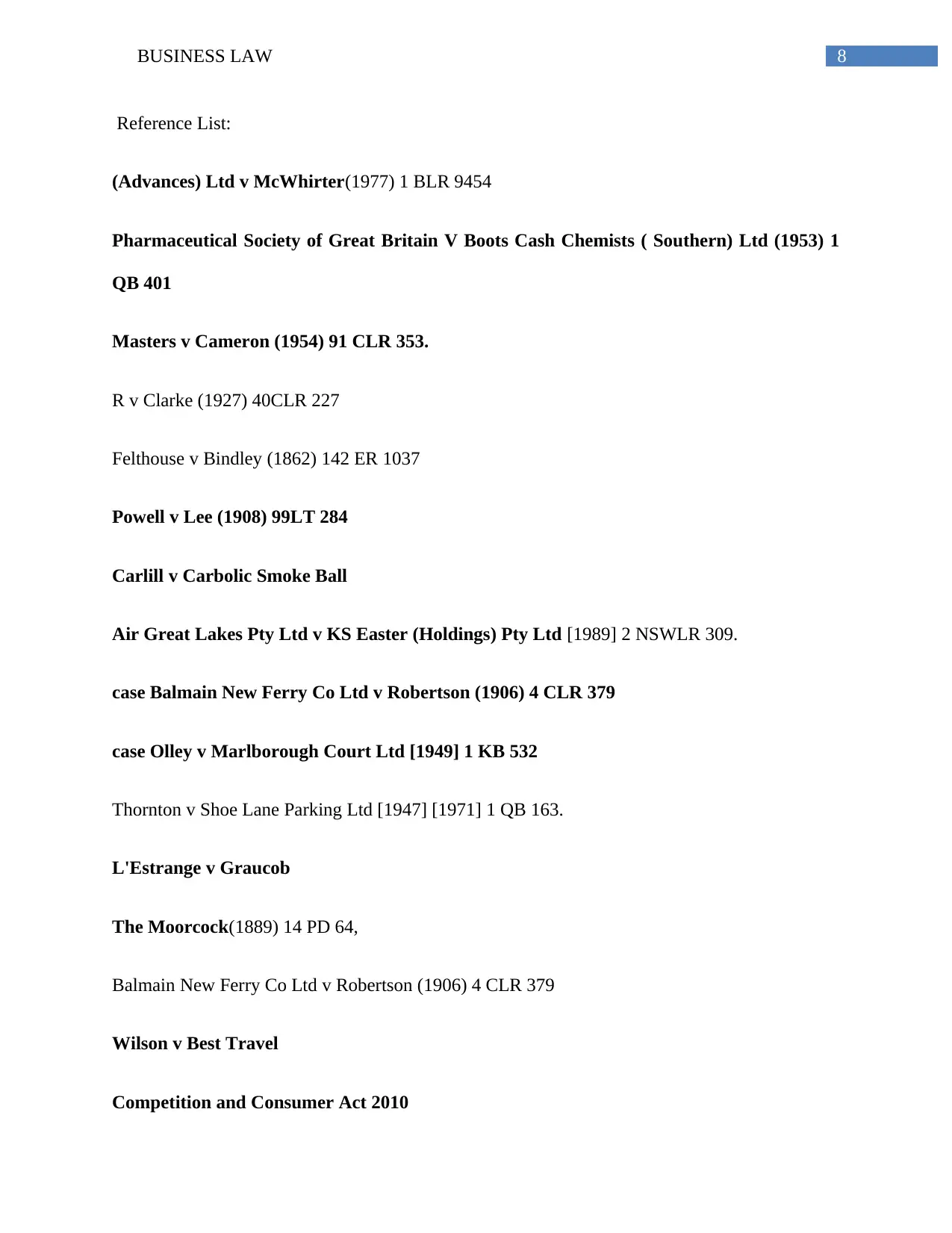
8BUSINESS LAW
Reference List:
(Advances) Ltd v McWhirter(1977) 1 BLR 9454
Pharmaceutical Society of Great Britain V Boots Cash Chemists ( Southern) Ltd (1953) 1
QB 401
Masters v Cameron (1954) 91 CLR 353.
R v Clarke (1927) 40CLR 227
Felthouse v Bindley (1862) 142 ER 1037
Powell v Lee (1908) 99LT 284
Carlill v Carbolic Smoke Ball
Air Great Lakes Pty Ltd v KS Easter (Holdings) Pty Ltd [1989] 2 NSWLR 309.
case Balmain New Ferry Co Ltd v Robertson (1906) 4 CLR 379
case Olley v Marlborough Court Ltd [1949] 1 KB 532
Thornton v Shoe Lane Parking Ltd [1947] [1971] 1 QB 163.
L'Estrange v Graucob
The Moorcock(1889) 14 PD 64,
Balmain New Ferry Co Ltd v Robertson (1906) 4 CLR 379
Wilson v Best Travel
Competition and Consumer Act 2010
Reference List:
(Advances) Ltd v McWhirter(1977) 1 BLR 9454
Pharmaceutical Society of Great Britain V Boots Cash Chemists ( Southern) Ltd (1953) 1
QB 401
Masters v Cameron (1954) 91 CLR 353.
R v Clarke (1927) 40CLR 227
Felthouse v Bindley (1862) 142 ER 1037
Powell v Lee (1908) 99LT 284
Carlill v Carbolic Smoke Ball
Air Great Lakes Pty Ltd v KS Easter (Holdings) Pty Ltd [1989] 2 NSWLR 309.
case Balmain New Ferry Co Ltd v Robertson (1906) 4 CLR 379
case Olley v Marlborough Court Ltd [1949] 1 KB 532
Thornton v Shoe Lane Parking Ltd [1947] [1971] 1 QB 163.
L'Estrange v Graucob
The Moorcock(1889) 14 PD 64,
Balmain New Ferry Co Ltd v Robertson (1906) 4 CLR 379
Wilson v Best Travel
Competition and Consumer Act 2010
⊘ This is a preview!⊘
Do you want full access?
Subscribe today to unlock all pages.

Trusted by 1+ million students worldwide
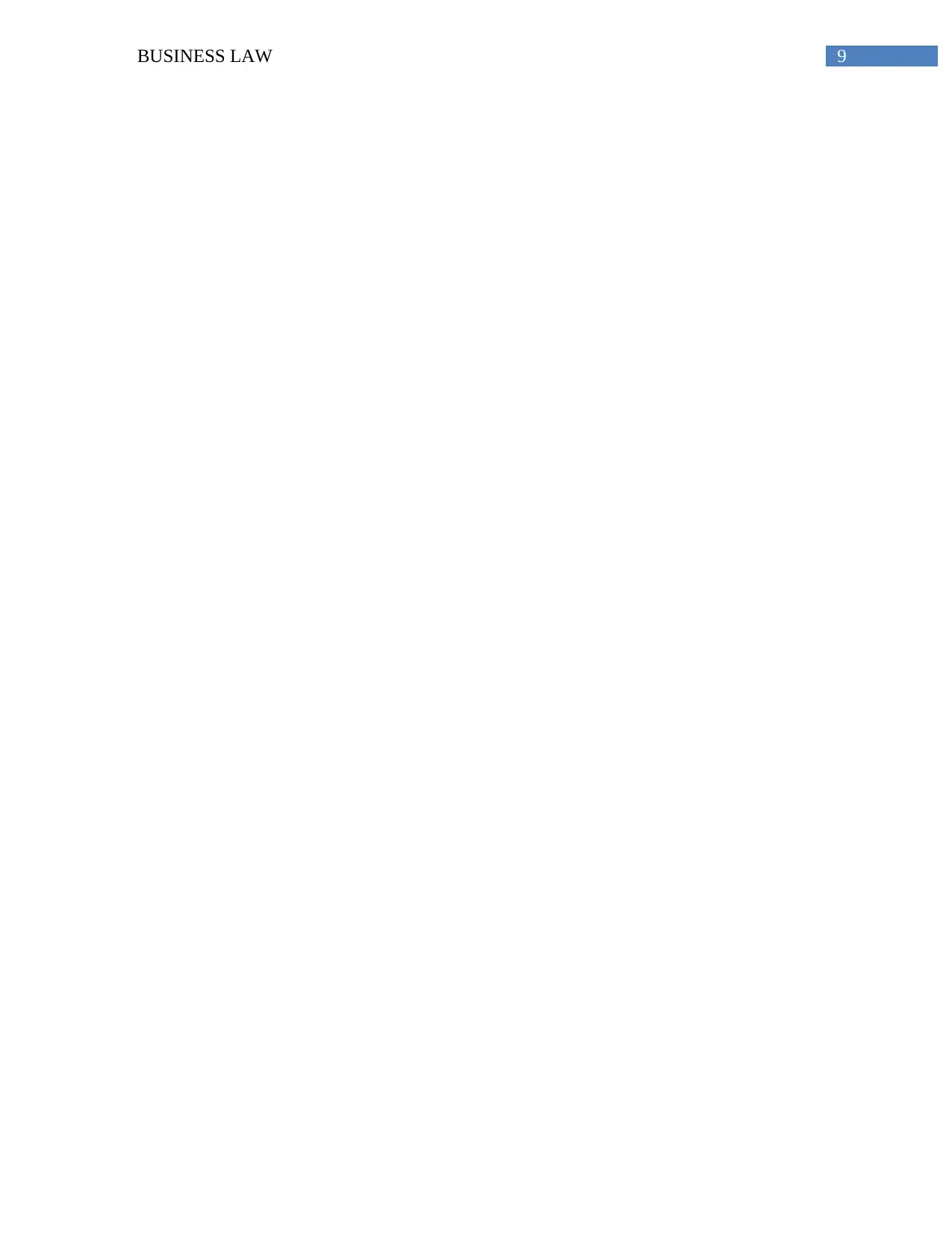
9BUSINESS LAW
1 out of 10
Related Documents
Your All-in-One AI-Powered Toolkit for Academic Success.
+13062052269
info@desklib.com
Available 24*7 on WhatsApp / Email
![[object Object]](/_next/static/media/star-bottom.7253800d.svg)
Unlock your academic potential
Copyright © 2020–2026 A2Z Services. All Rights Reserved. Developed and managed by ZUCOL.





